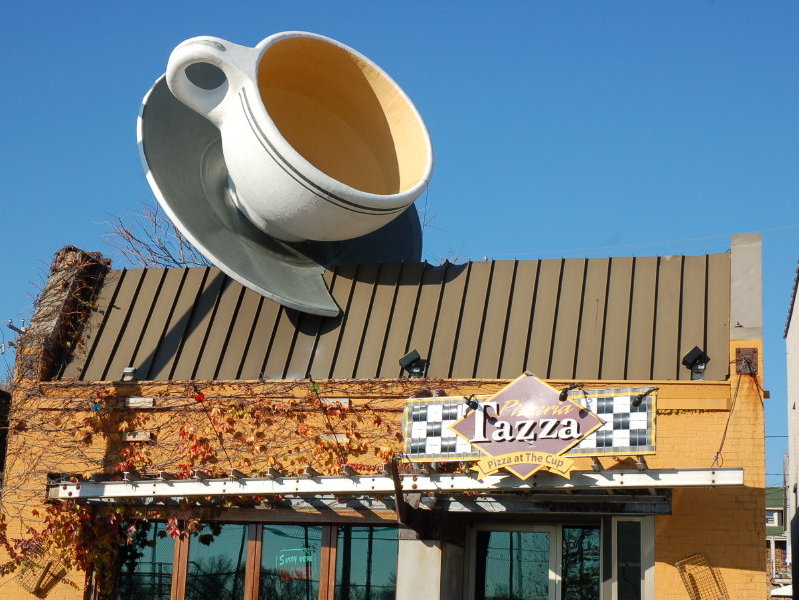In this, the summer of Milwaukee's first $100 pizza, it's appropriate to consider where this all started. By this, I mean where the first slice of pizza was served in Milwaukee, who made it and how it tasted.
For many of us, pizza is one of the basic food groups, and it is difficult to imagine the American diet without it. But 60 years ago there was no frozen pizza aisle in the supermarkets where your parents or grandparents shopped.
Pizza Hut, Papa John's and Nick-N-Willy's were concepts still to be conceived. Nobody had ever heard of pepperoni.
Milwaukee's first slice was served in 1945 in the Historic Third Ward. John Caravella and Joe Todaro combined their energy and last names to open the Caradaro Club on the ground floor of a three-story building that stood on the site of the present Catalano Square. It looked like a tavern, and the upper floors were a boarding house.
After 25 years, ownership passed to Consiglio Cirillo, and when fire destroyed the Caradaro Club in the '70s, he moved the business out of the Third Ward. Using the name and recipes, Cirillo operated Caradaro Clubs in Muskego and on 81st and National before settling into a small carry-out and delivery-only Italian restaurant at 1417 S. 70th St.
On a summer night in 2002, Wally Kutch, who had been eating Caradaro pizza since his parents took him to the Third Ward location as a kid, stopped at the 70th St. restaurant with his girlfriend to pick up a pie. A manufacturing engineer with a degree from MSOE, he owned his own plane and a business that built complicated tools and machinery for everyone from Toyota to the Defense Department. His company designed and manufactured Koepsell's popcorn wagons.
Cirillo told Kutch he wanted to retire and sell the pizza business. "I told him I would buy it," Kutch recently recalled. "He thought I was kidding."
By the time the engineer left with his pizza, negotiations on the sale had begun. An earnest money check soon followed, and Kutch went from designing and building 80-ft. industrial and infrared ovens to spending his nights sliding pies into and out of pizza ovens. He sold his airplane, dissolved his engineering and manufacturing business, and assumed the mission of keeping the Caradaro Club name and recipes alive.
Consider it the priesthood of pizza. Wally Kutch probably qualifies as a bishop.
With business partner Judy Grimes, Kutch opened a second Caradaro Club location at 5010 W. Vliet St. last year. The pizza sold at both restaurants is authentic in taste, its paper-thin crust and the tavern-style square cut to what the founders of the Caradaro Club served in the Third Ward. The Vliet Street outlet includes seating for about 50.
Kutch's devotion to maintaining the purity of the Caradaro pizza tradition is intense. After buying the business, he shrunk the small menu, eliminating spaghetti and a fish fry. Pizzas come in 12, 14 and 18-inch sizes, and the most exotic topping you can order is anchovies.
"You've got to keep it simple and follow what you do best," the owner said. And what is the secret to the Caradaro taste?
"More tomato paste. Our sauce is more tomatoey. We do not add sugar."
The pizzeria does offer a lasagna dinner with garlic bread ($8), a meatball sandwich ($6.50), an Italian sausage sandwich ($6.50) and a chicken tenders dinner ($6.80). Six appetizers run from garlic bread ($1.80) to mozzarella marinara ($4.70).
A certain whimsy accompanies the loyalty that drives Kutch's passion for the Caradaro tradition. A giant coffee cup and saucer, left over from the days the Milwaukee Coffee Co. occupied the space, adorns the roof of the Vliet Street location. The only signage identifying the pizzeria is rather small lettering on its door.
The restaurant is plain and basic, with mix and match chairs for seating. We shouldn't expect fancy and splashy from a fellow who gave up a successful engineering career to join the pizza priesthood.
"I was tired of my life as an engineer," Kutch explains. "Why were we killing ourselves? When Consiglio told me he wanted to sell, I knew this was my perfect next opportunity. It was quite a relief.
"People smile with every pizza served. We do it one customer at a time, and everybody loves us.
"It's a neat lifestyle. You meet so many interesting people.
"There is a regular cash flow. It comes through the door in little pieces, but there is a joy in every $20 bill we get."
Damien has been around so long, he was at Summerfest the night George Carlin was arrested for speaking the seven dirty words you can't say on TV. He was also at the Uptown Theatre the night Bruce Springsteen's first Milwaukee concert was interrupted for three hours by a bomb scare. Damien was reviewing the concert for the Milwaukee Journal. He wrote for the Journal and Journal Sentinel for 37 years, the last 29 as theater critic.
During those years, Damien served two terms on the board of the American Theatre Critics Association, a term on the board of the association's foundation, and he studied the Latinization of American culture in a University of Southern California fellowship program. Damien also hosted his own arts radio program, "Milwaukee Presents with Damien Jaques," on WHAD for eight years.
Travel, books and, not surprisingly, theater top the list of Damien's interests. A news junkie, he is particularly plugged into politics and international affairs, but he also closely follows the Brewers, Packers and Marquette baskeball. Damien lives downtown, within easy walking distance of most of the theaters he attends.




